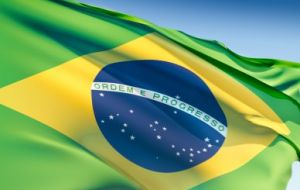MercoPress. South Atlantic News Agency
Brazil’s Real at it highest in 8 months; Bovespa up 40% so far this year
 Investors return as the Brazilian economy seems to be turning the corner
Investors return as the Brazilian economy seems to be turning the corner The Brazilian currency reached its highest level in eight months on Friday as signs that the world economy is bouncing back and there’s a return of capital inflows to emerging markets. Similarly the Bovespa market index rose 12% in May totaling 40% since the beginning of the year.
The Real strengthened about 1.7% to 1.975 per US dollar, its highest level since early October, having earlier crossed the psychologically important 2-per-dollar mark. The currency soared 10.4% in May, the biggest monthly rally since April 2003.
The currency rise came as the dollar hit a five-month low against a basket of major currencies as hopes for a global economic recovery drove investors to higher-yielding currencies and assets.
The Bovespa stock index gained 0.3% to 53,197.73 points, recouping earlier losses and clocking more than 12% gains this month and 40% since the beginning of the year. The rise was helped by higher US stocks as rising commodity prices lifted shares of natural resource companies.
However Brazilian government officials have expressed concern over the recent surge of the Real, which some fear will hurt exports at a time when demand is already waning because of the global economic slowdown. The Central Bank has tried to soak up the flood of greenbacks by offering to buy US dollars in the foreign exchange market.
Finance Minister Guido Mantega denied local media reports that the government would reinstate a tax on foreign investments in local bonds to limit the inflow of dollars to the country and curtail a rally in the country's currency.
Itau, Brazil’s largest private bank said in a note the recent pickup in inflows has come primarily from foreign direct investment and equity portfolios, so a return of the so-called IOF tax would not have much of an impact.
“If introduced, an IOF tax should not make much of a dent on inflows, especially if falling risk aversion continues to foster direct investment and equity purchases,” Itau said.
Yields on interest rate futures contracts were mostly lower on expectations a stronger Brazilian currency will ease inflation pressures and pave the way for the Central Bank to cut the benchmark Selic rate further from an all-time low of 10.25%.




Top Comments
Disclaimer & comment rulesCommenting for this story is now closed.
If you have a Facebook account, become a fan and comment on our Facebook Page!